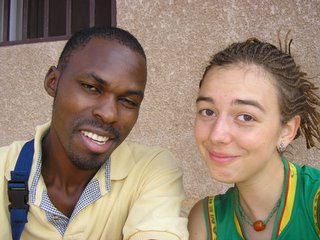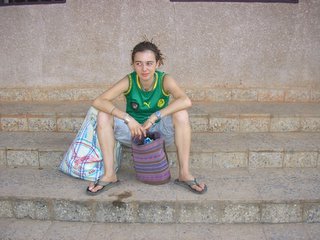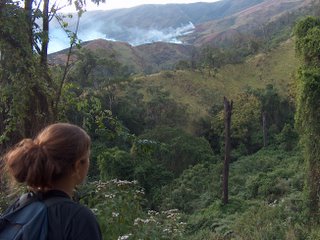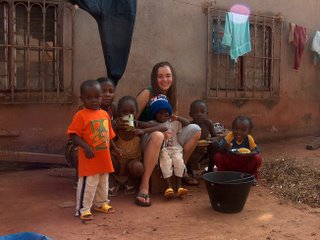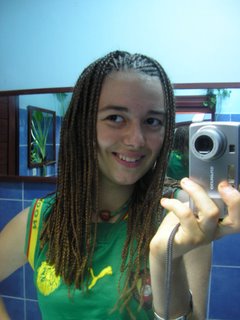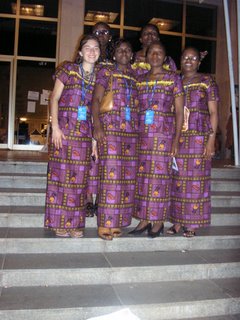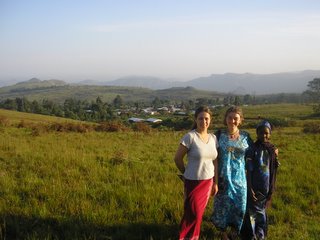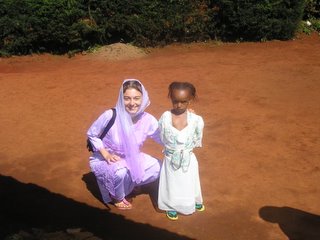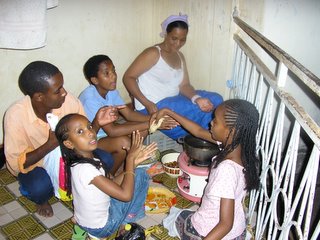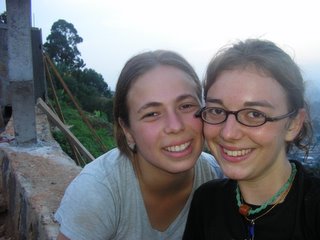The End of a Regimen
My long and beautiful (and heavy-as-hell) braids are out.
I wore a scarf and wool peacoat for most of this week.
And, to top it all off, I took my last Doxycycline pill today.
It was supposed to be a ritual moment rising above the daily and ordinary - something emotional, ceremonial, even memorable - but it was not. The end of a malaria prophylaxis regimen just slid and slumped into the day, more unnoticed than ever before. As is actually quite rare for me, I forgot the little blue capsule this morning... Even worse, I didn't agonize over that minor medical and major ceremonial infraction; in fact, by the time I arrived at my 9 a.m. econ recitation, I had forgotten that I had forgotten. When I finally made it home tonight for a brief bag-repacking, I popped that last Doxy into my mouth as a mere second-thought, even without water to wash it down, because there wasn't time. And, amazingly - disappointingly, it went down well. No sticking, no choking, no nausea, no dry mouth. ...Just another, final day of heightened immunity against dangers that I no longer face.
Isn't it strange, how quickly we move on...? I was slightly let-down, for a while, with my weak culture shock; the entire thing was lame, uneventful, and nothing special to write about. Since my return, I have yearned to write in the blog, with news and rants and revelations - but they did not crowd my head. I simply got off of the plane in Pittsburgh, found a familiar kind of commotion still happening all around, stepped onto that moving walkway (toward baggage claim, toward a different life) like it was nothing out of the ordinary, and became a part of it. Everything in Cameroon that should have been ordinary was extraordinary, and all the relatively extraordinary things here instantly seemed so...ordinary. I found that friends were still friends, family was still home, and home was still there. It was comforting and lovely; but at the same time, I wondered when the reality would finally come crashing down on me. It never did. Or maybe it already had - gently nudging, instead of crashing, its way back into me.
So why do I feel different and so good today, and what am I writing about? The change that strikes me is not in my surroundings - but rather, in me. Of course, having culture shock against oneself would be awkward and probably internally/psychologically disruptive, and I cannot imagine it; but cultural awe - THAT I can tell you about. Someone asked me a cruel and well-rehearsed question the other day: "Which is better, Cameroon or Penn?" Well, there's no good answer. The bliss that I'm floating through now is not because Penn is wonderful and Cameroon was horrible; but because they are perfect complements. ...If I have just spent a semester eating prickly and tangy, shockingly pink fruits, bought in a somewhat prickly and tangy, startlingly loud market - then now I'm sipping on rich, frothy creams while smooth vanilla odors waft by, sinking into a velvet chair so wide and inviting that I lose my curled legs between its fuzzy purple armrests. A life of tang and spice desensitizes the tongue, and living on vanilla and froth forever would give me a tummy ache - but one after the other, alternating these worlds and sensibilities and stimuli, is like taking a never-ending, sweet, sweet vacation.
I can see now, that I didn't appreciate Penn before Cameroon. I resented its froth - too airy and foamy; its cream - too soft and thick; its plush chairs - too damn plush. But when all of that went missing in Cameroon, I had no qualms with finding substitutes, and I revelled in a semester-long parade through excessive color and sound, smell and taste, friends and travel and adventure. In so doing, I have realized that there is nothing necessarily noble or selfless (perhaps only soul-less) about self-denial...particularly when those things offered can be better enjoyed and utilized by you, than by anyone else. Honestly - no Cameroonian in her right mind would deny herself the luxuries offered by Penn, if they were instead offered at her school, the University of Yaounde I. That would be stupid, self-injuring, and very short-sighted.
A huge part of being privileged, I believe, is accepting responsibility for all that one has. But how to do/be that? Well, for one: I have to be responsible to others, so that one day those with much less than I have, may have more. But also: I must be responsible to myself. ...Responsible and responsive, that is, to all that I have: loving family and great friends, inspiring role models in all of them, clean water, amazing classes, attentive and enthusiastic professors, internship opportunities, fast internet, warm shoes, bright lights, uni-ball pens, yoga classes, free time, a wide selection of good and fairly-priced diary products, etc. I will take advantage of these advantages - because I can do that, and ultimately translate that privilege into a power that creates advantages for someone else, more easily and efficiently than anyone else. The opportunities are, after all, knocking at MY door. It is time for me to answer to them.
...
Cameroon, once overwhelmingly foreign to me, is where I found countless homes. I found a home in the families that opened their doors and arms to host me - for I always had a room of my own, a warm and happy house to come back to, and, most importantly, a group of people who wanted to know me and grow close to me. I found a home at work - where I developed projects of my own, learned that an idle mind is the most insufferable work experience of all, and so struggled, and succeeded, in earning others' time and attention so that I could produce meaningfully. I found a home in distant lands, in Dschang and Yaounde, and in places even farther away than those - through travel that brought me to the doorsteps of strangers, passing nights as if old friends, and in the morning choosing plots of land for my future thatched hut in their village. But these homes I have left behind...to the extent that I can only visit them through phone and email contacts, until I return.
However, I also found a home in myself - a satisfaction, a sense of worth and guidance and purpose, that I did not before possess. That is the comfort and confidence that I carry with me, and that is the home in which I am now living. That is why I feel different and so happy; and that is why, every day, I remember and give thanks for the unforgettable experiences of last semester.
Love to everyone who I love, everywhere. Thank you for all your reading and supporting,
Mara/Chlodes


